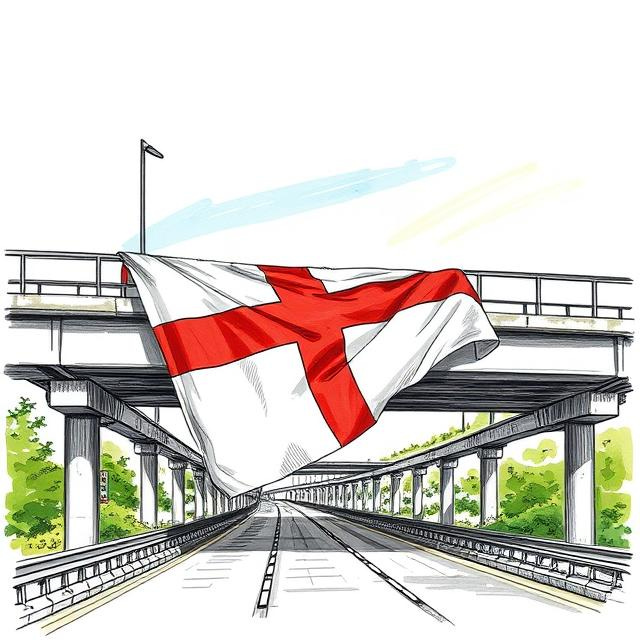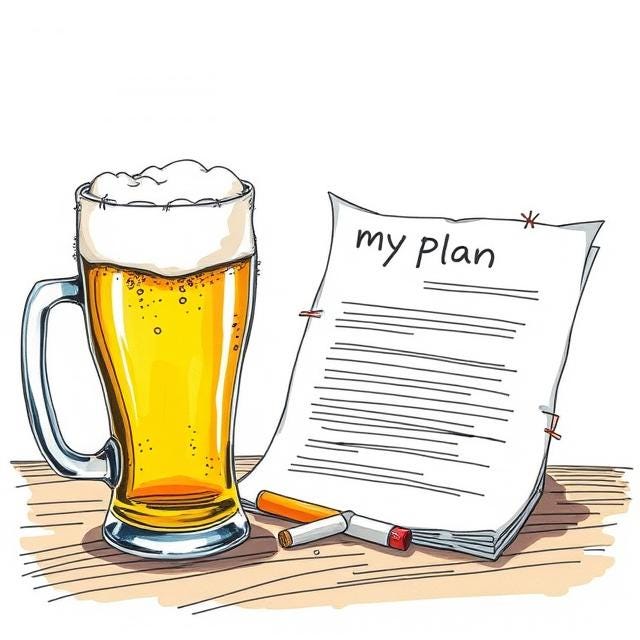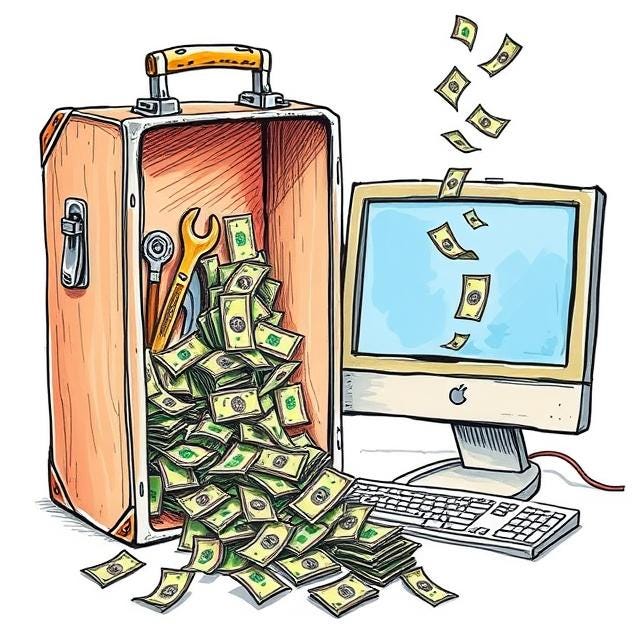Flags, Boats, Farage
What's going on?
Flags
The latest gambit of the far-right involves chucking flags wherever they can and graffitiing red crosses on roundabouts and shops.
To me, the sight of a tatty St George’s flag draped awkwardly over a motorway overpass is actually disrespectful to our flag and our country. Treating the American flag that way would be treasonous!
And, of course, chucking red paint on somebody else’s property to make a political point is the exact modus operandi of Just Stop Oil, the bugbear of the right-wing for the past five years. There’s a slight whiff of hypocrisy in their newfound love of vandalism.
But if you look beyond those points, the far-right’s flag play is pretty clever. Some people are of course just patriotic and proud to display the Union Jack or St George’s Cross. But with this surge, clearly, many people are using the flag to indicate their anti-immigration, often outright racist sentiments. Like the cross-burning of the Ku Klux Klan, it’s an attempt at intimidation. It’s saying: racists live here - you don’t know who we are, but watch your back.
Except, unlike the Ku Klux Klan, the use of the flag adds a layer of complication. Nobody can argue against displaying our own flag. The national flag is unassailable. It’s therefore a carefully laid trap by the far-right: clear in its intentions, yet immune to criticism.
To me, there is a solution. Starmer should come out and say that the British flag stands for tolerance, diversity, democracy and fairness: and belongs to all of us. He should encourage everyone that believe in those values to display it proudly. Distribute 10,000 free flags to schools and councils, even. In one punch, you take out the undertones of the current flag display. The far-right will quickly abandon it as their symbol of choice. It’s like when your parents download TikTok: all of a sudden, it’s not that edgy.
As I wrote last year: we mustn’t let the far-right and the populists steal our national symbols for their own nefarious purposes. Britain is great because it is compassionate, humane, democratic and diverse: the people cable-tying their decades old England football flags to lampposts want it to represent the opposite of those things.
Boats
But flags are the silly culture war at the surface of a much deeper problem.
People have real concerns about illegal immigrants crossing the channel. Those concerns are not at all misplaced. For one, crossing the channel is a hugely dangerous endeavour and very young children are being subjected to it every single day. Preventing that is a moral imperative.
Not only that, but we should be able to control our own borders: it is the first job of any government.
Of course we should welcome people that are fleeing persecution and war. But we also have to accept the reality: these boats are not coming from Afghanistan. They are coming from France.
(I can’t help but mention that small boat crossings are a problem that was created by Brexit. Pre-Brexit, less than 300 people arrived by small boat per year. Today, it is more like 30,000.)
Voters feel they are expressing their concerns about the small boats and not being heard. Despite their protests, the number of crossings keeps going up, and the hotel bill keeps going up.
But the truth is: voters are being heard. All of us, with perhaps the exception of the loony left, want to stop small boat crossings. They are dangerous, they are unfair, and they threaten our sovereignty. The problem is: it’s really bloody complicated.
How do you stop a small boat once it’s in the channel? Do you sink it and risk killing the men, women and children inside it? Do you drag it back to France - impinging French sovereignty and risking literal war with our neighbour and ally? Or do you breach several international laws and treaties by sending refugees away once they land on our shores? There is no good solution.
Starmer proposed smashing the gangs: naive to think it’d have a significant impact, but about as good as you can get without taking one of the poisoned pathways above.
The boring answer is to process asylum applications much faster: legally sending back those without a valid claim to being here, cutting the hotel bill and making the journey less appealing.
My idealistic view is that there should be a global consortium on refugees. One where the port of entry of a refugee is irrelevant: once registered at any country, they are processed by a centralised global body that assigns them to a country and supports them there through legal means. Your odds of getting to the UK would be identical whether you landed in Dover or Sicily.
But Farage insists there is an easy answer. Politicians aren’t stopping small boat crossings, he says, because they don’t want to.
As I’ve written before, the marker of the populist is that he promises easy answers to difficult questions. Farage’s plans would cost billions of taxpayer money (far more than we spend on hotels) to lock up and ship out people who - he says - have come here illegally.
Let’s ignore the fact it’s a plan that'd slink our country into enormous debt and require us to abandon international treaties and human rights acts: alienating our allies and damaging our standing on the global stage.
Farage’s plan would require unimaginable levels of cruelty. The simple fact is that many legal immigrants would get caught in the crossfire. Just as in the Windrush scandal: people that are here legally, have built homes, businesses and careers in this country would be sent away.
Our justice system prioritises the freedom of the innocent over the detention of the guilty because it’s unimaginable to spend your life in prison for a crime you didn’t commit. Our immigration system should, in the same vein, ensure that people with a right to be here are not deported unfairly: even if it means some that shouldn’t be here slip through.
Farage
Voters like and trust Farage because they feel like he’s hearing them.
Mainstream politicians like Starmer aren’t being clear enough: we hear you, too. We want the same thing you do. Farage isn’t listening to you, he’s lying to you. He’s promising you easy answers to difficult questions.
If it was easy to stop the small boat crossings, don’t you think Starmer would’ve done it? Or Sunak?
The rise of Reform speaks to a bigger picture change in the nature of British politics.
In 2016, the left-right paradigm that has defined politics for 100+ years was permanently fractured.
Capitalism created wealthy winners and struggling workers. Now globalism has done the same.
Globalism created a surge of cheap labour, pushing down the availability and salaries of traditional trade and service jobs. But it also created a new flow of capital: overseas investors pushed up the salaries in industries like finance and tech.
The wealthy winners today vote to remain in the EU. They back Kamala Harris. They’re unconcerned about immigration. They’re not rooted in one place, because they can always move if they need to. With that comes an ambivalence and a snootiness.
Others have been left behind by globalisation: they feel a greater sense of belonging not just to their nation but even to their town or city. They want leaders that put our country first. But with that comes a degree of cruelty, or at least a lack of empathy, to outsiders.
This is the only explanation for why lifelong Labour voters chose Brexit in 2016 and Boris in 2019. Why American Democrats and Republicans both voted for Trump. And it’s the only way to explain Farage’s enduring popularity.
It’s why Labour and Conservative almost feel like one side of the same coin against a surging Reform UK. It’s why Reform can pledge to spend £141 billion (including £17 billion for the NHS) with a straight face: that’s undeniably left-wing economic policy for a party that is repeatedly described as right-wing.
I suspect the globalist-nationalist paradigm will define politics for at least the next decade, in the UK, US, Europe and perhaps beyond. But, in order to win, the globalists must put forward a compelling case to everyone: including those that have been left behind. Else, more and more people will be enticed by Farage’s false promises of sunlit uplands in a Britain First world.




